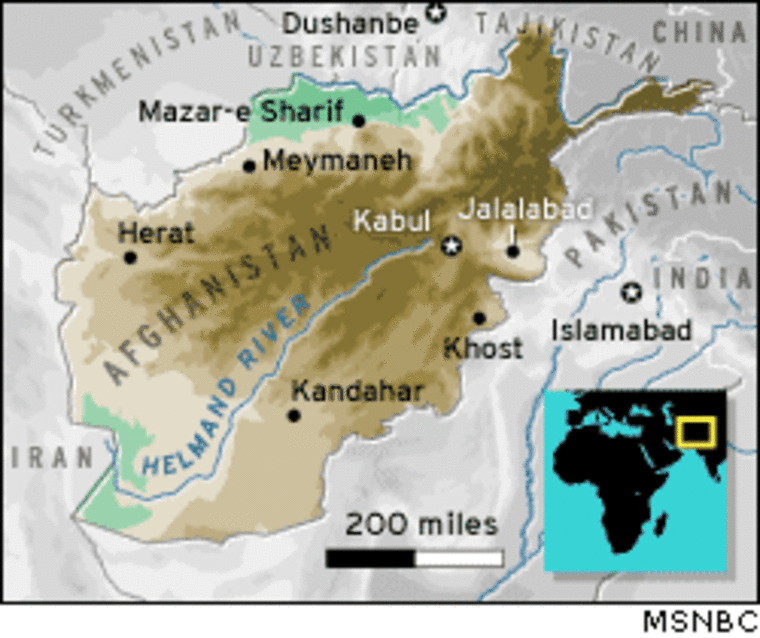President Bush outlined five initiatives Tuesday to help Afghanistan continue to move toward peace and prosperity so it never again is a “terrorist factory.”
“My government reaffirms its ironclad commitment to help Afghanistan succeed and prosper,” Bush said, standing in the Rose Garden next to Afghan President Hamid Karzai.
Bush said the United States, which in recent months has increased its force in Afghanistan to about 20,000 troops, was helping to build the new Afghan national army and train new Afghan police and border patrol.
Moreover, Bush said, the United States was helping foster democracy by training newly elected politicians, expanding culture and education exchange programs, pursuing bilateral trade and investment, working to print new textbooks and build schools for both boys and girls, and providing small-business grants to women.
Bush said that Afghanistan was “no longer a terrorist factory” and that it was no longer “sending thousands of killers into the world.”
‘A long road ahead’
Karzai joined Bush in portraying Afghanistan as a success story, touting economic growth of more than 25 percent last year and projections this year of growth of 20 percent.
“This could not have been possible without your help, without America’s assistance,” Karzai told Bush, adding that in a meeting with members of Congress, he “thanked America for the help that it gave us to liberate ourselves and rebuild ourselves and prosper.”
A congressional source told Reuters on condition of anonymity that Karzai asked lawmakers for a multi-year package that would provide funding of $2.2 billion a year.
In a 20-minute speech in the House chamber, Karzai touted the end of a long period of “oppression and terror.” But he added that there was “a long road ahead.”
Since U.S., Afghan and other coalition forces ousted the repressive Taliban regime that harbored al-Qaida terrorists, international efforts have helped improve schools, health care and roads. The country also is preparing for elections.

One of the biggest problems facing Afghanistan’s first elected post-Taliban government will be the country’s illicit cultivation of opium poppies, which satisfied almost three-fourths of the world’s opium demand last year. The trade, 20 times that during the Taliban’s last year, brought in $2.3 billion, more than half of Afghanistan’s gross domestic product. Experts expect plantings to be bigger this year, to a record level.
“We must build a partnership that will consolidate our achievements and enhance stability, prosperity and democracy in Afghanistan and in the region,” Karzai said. “This requires sustaining and accelerating the reconstruction of Afghanistan through long-term commitment,” he said.
The speech was interrupted by applause more than a dozen times.
“I thank you and the people of this great country for your generosity and commitment to our people,” Karzai said. “You have supported us with your resources, with your leadership in the world community and, most importantly, with the precious lives of your soldiers.”
Call for NATO help
Karzai asked for a free-trade agreement and incentives to the private sector for investing in Afghanistan. Karzai said Monday that he was satisfied that the Bush administration had remained focused on helping stabilize his country but he wanted NATO to do more.
NATO already is commanding the International Security Assistance Force in Kabul, the Afghan capital, as well as a reconstruction operation in the northern city of Kunduz. The alliance has pledged to expand its security operations to cities elsewhere in the war-torn country this summer.
Karzai and Defense Secretary Donald Rumsfeld addressed reporters Monday beside a memorial plaque on a section of the western wall of the Pentagon, where American Airlines Flight 77 slammed into the building on Sept. 11, 2001, killing all 64 people aboard the hijacked plane and 125 more in the building.
Asked about the chances of capturing Osama bin Laden, whose al-Qaida network is blamed for the attacks on New York and Washington, Rumsfeld said he was certain that he would be caught eventually. Karzai said bin Laden was on the run and could not stay hidden indefinitely.
“Has a fugitive run forever? No, at least not in my country,” he said. “We will catch him one day, sooner or later.”